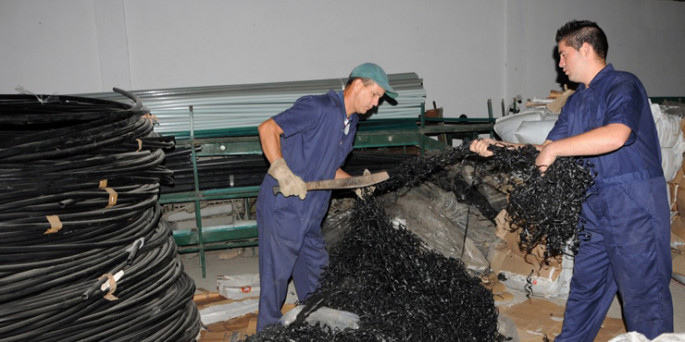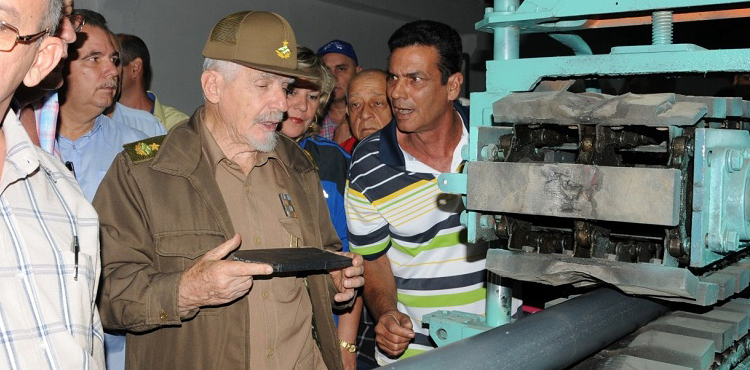
Urban cooperatives in Cuba: Yes — but no
SANCTI SPÍRITUS — Last February, when Ramiro Valdés Menéndez visited the urban cooperative La Esperanza [The Hope] in the city of Fomento, the 11 partners saw the clouds part above.
The vice president of the Councils of State and Ministers, in person, was interested in the manufacture of plastic tubing, not during a meeting in an office but through a methodical tour of the shop.
He watched the day’s work, rummaged through the raw materials, talked with Julio Ramón Cermeño, the man who invented each one of the machines in use, assessed the quality of the hoses just made, and was dazzled by the so-called “plastic wood,” a secondary product of the small factory.
Two months later, another vice president of the Council of State, Salvador Valdés Mesa, made the same tour of the tubing factory, a gesture that its workers interpreted as a show of governmental support to the incipient cooperative. Today, however, they’re not so sure.
“Ever since Comandante Ramiro’s visit, we’ve been asking for permission to expand the factory, because — obviously — we’re running out of space here,” says vehemently Yoel Torres Hernández, president of La Esperanza and a practicing lawyer, while guiding this reporter past the boxes of raw materials, the rumbling machines and the rolls of hosing ready for shipment.

He’s trying to prove a point: the place is overcrowded.
“And after all this time, they’ve still not given us an answer,” he adds.
Torres explains the inconsistency with a thought that he has mulled after innumerable consultations with fellow entrepreneurs in other parts of the country.
“Urban cooperatives are trapped in a dual discourse. On one hand, we are told that the process of development of our kind of enterprise is irreversible, and on the other hand we’re tripped every day with arguments like ‘this won’t work,’ or ‘what do you need this for?'”
Torres’ experience is replicated — with slight variations — in the almost 500 cooperatives that were legally operating in Cuba by late May, 500 small businesses that have embarked on their own to sail through the so-called “experimental phase” of cooperative labor.
Neither state-run nor private
“We haven’t invented a thing. It’s all here,” Torres explains, waving a copy of the Guidelines of Economic and Social Policy of the Party and the Revolution, approved in April 2011.
From the start, the document states that “this model of management recognizes and promotes — in addition to the socialist state enterprise, which is the main form in the national economy — the modalities of foreign investment permitted by the law […] the cooperatives, the small farmers, the owners in usufruct, the leasers, the self-employed workers and other forms of employment that, as a whole, should contribute to elevate efficiency.”
Nevertheless, one year and seven months went by before, in November 2012, the Council of State issued the governing documents: Law/Decree #305, cornerstone for the operation of urban cooperatives and Law/Decree #306, which deals with the special Social Security coverage granted to cooperative members.
It took just as long for the Council of Ministers to approve Decree #309, a sort of manual for first-level cooperatives.
Those are the guidelines for the more than 2,300 workers who, according to the National Office of Statistics and Information, have opted for a form of employment that — according to experts — is a kind of hybrid between the private sector and the state enterprise.
Perhaps because this new labor modality is still in development, the nation’s leaders have been watching with a magnifying glass every aspect of the process.
At its most recent session, the Council of Ministers officially acknowledged the flaws that many cooperative workers had already pointed out: the difficulty in accessing supplies by legal means, and the trend toward a constant increase in the prices of services and products, especially in farmers’ markets and the restaurant sector.
Without approving the much-requested wholesale markets that would guarantee stable supplies for the nonstate sector at competitive prices, thus preventing inflation in the cost of merchandises and services, the Council of Ministers decided “not to massively expand the creation of cooperatives. The priority will be to consolidate the existing ones and move ahead gradually, because otherwise we’d be generalizing the problems that come up.”
A full-sail experiment?
“It’s like stepping simultaneously on the accelerator and the brake.” That’s the description given by a workman at La Esperanza of the crossed fire in which he believes his company now finds itself. La Esperanza is the only urban cooperative in Cuba devoted to the manufacture of garden hoses, tubes for electrical and sewage use, and a long et cetera of plastic devices.
Judging from the indicators, everything shows that the business is going well. Last year, the members received an average wage of 5,000 pesos a month ($189), between advance payments and final profits. By the end of April this year, they had delivered more than 545,000 pesos ($20,566) to the fiscal budget.
The factory maintains an adequate tax discipline and meets its debt payments to the bank, according to a report made by the provincial government to which the press had access.
In addition to the performance of the seven urban cooperatives now in operation in Sancti Spíritus, that document lists more than 10 applications from similar groups that have been sent to the ministries of Construction, Communications, Industry and Transportation for approval.
“In general, we consider that the cooperatives have contributed to elevate the quality of productions and services,” says Roberto Fajardo Veloso, vice president of the Council of Provincial Administration, which oversees the program of economic and social development.
Fajardo cites figures to buttress his belief. During 2014, the non-state sector contributed 63 million pesos ($2,377,358) to the national budget, “and this year it will be more,” he adds.
Among the problems identified by the local government is the fear of many state-run businesses to enter into contracts with these associations. Then there’s the urgent need for a wholesale market.
And a new concern has arisen: the possibility of tax evasion. Provincial government authorities now devote 30 percent of their supervisory activities to a rigorous examination of nonstate enterprises.
The insistence on close control may have been caused by three radical events:
- A refusal of the Ministry of Transportation to recognize an association engaged in the rental of bicycle-taxis, inasmuch as that activity falls under the designation of self-employed entrepreneurship.
- The rejection of an application from a cooperative engaged in the manufacture and installation of electric motors that didn’t submit guarantees of its supplies of raw material.
- The dissolution of the Lapinet Construction Co., first cooperative of its type to operate in Sancti Spiritus, which, according to government sources, revealed “legal irregularities.”
Willingness to negotiate
Out of 300 state-run companies and 20-some cooperatives that participated in the Second Fair of Conciliation and Fidelity to the 2016 Plan, La Esperanza stole the show with its display of plastic wood.
“We detected a 20-million-peso demand for that unique product, a demand we cannot fill and are renouncing,” says president Yoel Torres, pain in his voice.
“To deal with that production volume we need machinery, which could come from other industries that are not using it. But the businessmen are shutting us out. They say that they can’t lease it or sell it to us. They say that they have to wait from approval ‘from above.’ We can’t move ahead that way.
“To increase the production of plastic wood we could turn to foreign investment. The law takes cooperatives into account and gives them their space. However, we applied for a partnership with a Mexican company and the response from the [Cuban] Ministry of Industry was that the procedures for implementation are not yet ready.”
“How do you appraise the development of this form of business?” I asked Torres.
“It’s however anyone wants to view it. I see the processes as slow. They say that it’s necessary to speed up production but we’re tied down. Every time I go to a meeting of cooperatives, I hear the same. In Sancti Spiritus — and in the rest of the country, I believe — there is a lack of willingness to negotiate, to agree,” he answers.
The Council of Ministers seems to agree with that opinion, because it amended Law/Decree #305 and Decree #309 so as to adjust the rules to the current circumstances, although suspicious minds may have interpreted the official statements as a sign of retreat.
Just in case, Torres pinned to the door of his office a kind of prescription that his associates are calling The Ten Commandments. The last item reads: “You cannot help men permanently by doing for them what they could and should do for themselves.”
“Abraham Lincoln said that,” he says proudly, without realizing that it was the Rev. William J. H. Boetcker who published the so-called Decalogue of Prosperity in the early 20th Century, and that there is no way — no matter how hard plastics manufacturers may try — to adjust that precept to the very peculiar economic model that the island is trying out today.
Progreso Semanal/ Weekly authorizes the total or partial reproduction of the articles by our journalists, so long as the source and author are identified.





